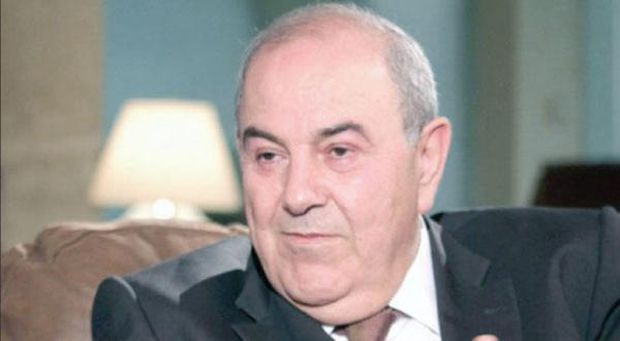Allawi, the leader of the Wataniya parliamentary bloc, said that the government of Prime Minister Nuri Al-Maliki had been lax in efforts to secure the regions west of the capital Baghdad in order to target supporters of his party and coalition in the run-up to Iraq’s general election, scheduled to be held on Wednesday.
Speaking to Asharq Al-Awsat in his Baghdad office, Allawi—who served as interim prime minister from mid-2004 to 2005—said: “The deliberate flooding of areas west of Baghdad and the military operations in Fallujah and Ramadi, as well as the displacement of tens of thousands of residents, are deliberate actions against our bloc, because the residents of these areas are supporters of the Wataniya bloc.”
According to press reports, members of the Islamic State of Iraq and Syria (ISIS) group, which is battling the government for control of the western province of Anbar, closed several gates on the Fallujah dam late last week, causing flooding in areas west of Baghdad.
Allawi hit out at Baghdad for what he said was its failure to assist local residents affected by the flooding.
He said: “[The government] did not take any measures to help save the people of west Baghdad, especially the area of Abu Ghraib which was deliberately flooded and caused casualties and material damage, and displaced thousands of residents . . . [on Friday] I visited the areas of west Baghdad and looked at their suffering and met many residents who demanded help form the government to save their lives and properties.”
On the topic of this week’s elections, Allawi said he was willing to serve in a coalition government with parties from across the spectrum of Iraqi politics.
He said: “We are open to all national forces, such as the Kurdish brothers and the Islamic Supreme Council of Iraq (ISCI), as well as the Sadrist Movement, and we have no problems with our brothers at the Mutahidoun bloc or any forces whose election programs are in harmony with our program in building a state of civil institutions and the sovereignty and independence of the judiciary, liberty, security stability and ensuring resources are used in the interests of Iraqi people.”
Allawi also spoke about Iraq’s previous general election in 2010, during which his Iraqiya List won the largest number of seats but was unable to form a government, which the former prime minister blamed on Iranian interference.
He said: “the Iraqiya [List] won the last election but Iran drew a red line against our forming of the Iraqi government and refused to allow us to form the government, insisting that Maliki stayed with the support of the Americans, unfortunately . . . We are not against our eastern neighbor, but we are against Tehran’s interference in Iraqi internal affairs.”
Allawi called for a regional and international effort to fight the Al-Qaeda and ISIS. He said: “I met the Iranian ambassador at a dinner party and we discussed the issue of Al-Qaeda, and the efforts made to fight the organization which has reached as far as Africa, and that their operations will not only affect Iraq and Arab countries, but even Iran, Turkey and Europe, and I find it strange how the world remains silent about the operations of ISIS in Iraq and Syria.”
On the situation in Syria and the participation of Iraqi militias in the fighting there, Allawi said: “There are Sunni militias fighting with ISIS or Al-Qaeda against the Syrian regime, and there are Shi’a militias fighting in defense of this regime, and this is public knowledge.”
He added: “Iraq has been living in a state of war since the early 1990s, or even the 1980s, the time of the Iraq–Iran War . . . this state, which has exhausted our people, must end before it leads to a civil war.”

